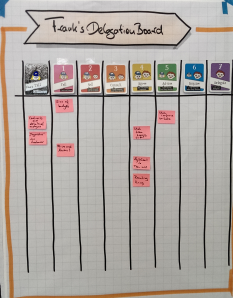I love Delegation Boards since I first learned about them in Jurgen Appelo’s book “Management 3.0”. If you have not heard about them yet, you can find a good introduction here at the Management 3.0 website.
A couple of month ago I became the head of a department of Agile Coaches and Agile Project Managers. To help me find my own way of leading, especially when it comes to making decisions, I started to set up my delegation board.
Soon after I was installed in the new position my team, other colleges and the whole company expected me to make decisions about anything. I had no chance to do an upfront planning of my delegation levels and so I decided to fill the Delegation Board on the fly.
It was like saying to my team “Hey team, I decided about this, you see and I did it all alone. What do you think about it?” This helped me a lot to reflect about an appropriate delegation levels for my different responsibilities and it was a clear message to my team, that I expect them to challenge me continuously for advancing to more deliberate delegation.
For instance I was asked by HR if I want to have some trainees in my department. We never had any and so I directly said no. This was a decision and I did not even ask my team what they think about having trainees with us.
So at least I put a sticky note onto my delegation board in the “Tell” column with the topic “Do we need trainees”. I told the team I made that decision alone and I’m not sure if it is a good idea to make those decisions alone. If they feel uncomfortable about it too, they should please actively challenge it to a higher delegation level.
At the same time I came to learn that there are decisions I make, that I don’t even tell my people about. It happened when I was hiring a new freelancer as an Agile Coaches for my department. We negotiated salaries and only the candidate and me were part of that discussion. Finally we came to an agreement about the pay.
That was a decision I made that would not even fit into the “Tell” column, because I did not intend to tell my other employees about the result of the decision. Right now we simply do not have that kind of culture where employees know and discuss salaries openly.
Still I wanted to make transparent that I make those kind of decisions. They should know I decide about salaries for external and internal employees. And they should not that I would not even tell them, what the result of the decision was. Knowing this my employees have the chance to question the status quo. They can think about how they want to deal about salary negotiation and suggest me another more open way of handling it.
Of course they can also decide that they are totally fine with the current situation and they like me to take care for that kind of administrative act as a service for them, which is what they are doing at the moment.
course they can also decide that they are totally fine with the current situation and they like me to take care for that kind of administrative act as a service for them, which is what they are doing at the moment.
In conclusion I’m convinced that the delegation board is a great tool to shape and develop your delegation and leadership style. And if you really believe in it, you should add another column “0 – Don’t Tell”.

